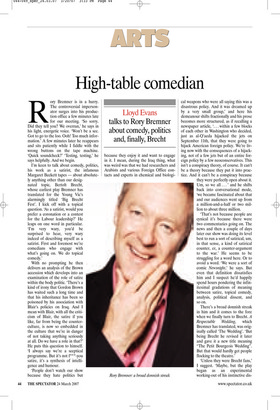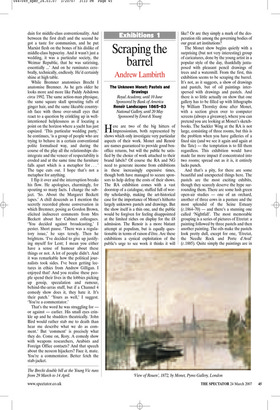High-table comedian
Rory Bremner is in a hurry. The controversial impersonator surges into his production office a few minutes late for our meeting. ŌĆśSo sorry. Did they tell you? We overran,ŌĆÖ he says in his light, energetic voice. ŌĆśWonŌĆÖt be a sec. Got to go to the loo. Ooh! Too much information.ŌĆÖ A few minutes later he reappears and sits patiently while I fiddle with the wrong buttons on the tape machine. ŌĆśQuick soundcheck?ŌĆÖ ŌĆśTesting, testing,ŌĆÖ he says helpfully. And we begin.
IŌĆÖm keen to talk about comedy, politics, his work as a satirist, the infamous Margaret Beckett tapes ŌĆö about absolutely anything other than our designated topic, Bertolt Brecht, whose earliest play Bremner has translated for the Young VicŌĆÖs alarmingly titled ŌĆśBig Brecht FestŌĆÖ. I kick off with a topical question. ŌĆśAs a satirist, would you prefer a coronation or a contest for the Labour leadership?ŌĆÖ He leaps on one word in particular. ŌĆśIŌĆÖm very wary, youŌĆÖd be surprised to hear, very wary indeed of describing myself as a satirist. First and foremost weŌĆÖre comedians who engage with whatŌĆÖs going on. We do topical comedy.ŌĆÖ With no prompting he then delivers an analysis of the Brown accession which develops into an examination of the role of satire within the body politic. ŌĆśThereŌĆÖs a kind of irony that Gordon Brown has waited such a long time and that his inheritance has been so poisoned by his association with BlairŌĆÖs policies on Iraq. And I mean with Blair, with all the criticism of Blair, the satire if you like, far from being the counterculture, is now so embedded in the culture that weŌĆÖre in danger of not taking anything seriously at all. Do we have a role in that?ŌĆÖ He puts this question to himself. ŌĆśI always say weŌĆÖre a sceptical programme. But itŌĆÖs not f***-you satire, itŌĆÖs a synthesis of intelligence and humour.
ŌĆśPeople donŌĆÖt watch our show because they hate politics but because they enjoy it and want to engage in it. I mean, during the Iraq thing, what was weird was that we had researchers and Arabists and various Foreign Office contacts and experts in chemical and biologi cal weapons who were all saying this was a disastrous policy. And it was dreamed up by a very small group,ŌĆÖ and here his demeanour shifts fractionally and his prose becomes more structured, as if recalling a newspaper article, ŌĆś... within a few blocks of each other in Washington who decided, just as al-QŌĆÖaeda hijacked the jets on September 11th, that they were going to hijack American foreign policy. WeŌĆÖre living now with the consequences of a hijacking, not of a few jets but of an entire foreign policy by a few neoconservatives. This isnŌĆÖt a conspiracy theory, of course. It canŌĆÖt be a theory because they put it into practice. And it canŌĆÖt be a conspiracy because they were perfectly open about it. Um, so we all ... ŌĆÖ and he shifts back into conversational mode, ŌĆśwe became fascinated about that and our audiences went up from a million-and-a-half or two million to about three million.
ŌĆśThatŌĆÖs not because people are cynical itŌĆÖs because there were two commentaries going on. The news and then a couple of days later our show was doing its level best to run a sort of satirical, um, in that sense, a kind of satirical counter, er, a counter-argument to the war.ŌĆÖ He seems to be struggling for a word here. Or to avoid a word. ŌĆśWe were a sort of comic Newsnight,ŌĆÖ he says. But even that definition dissatisfies him and I suspect heŌĆÖd happily spend hours pondering the infinitesimal gradations of meaning between satire, topical comedy, analysis, political dissent, and so on.
ThereŌĆÖs a broad donnish streak in him and it comes to the fore when we finally turn to Brecht. A Respectable Wedding, which Bremner has translated, was originally called ŌĆśThe WeddingŌĆÖ. ŌĆśBut being Brecht he revised it later and gave it a new title meaning ŌĆ£The Petit Bourgeois WeddingŌĆØ. But that would hardly get people flocking to the theatre.ŌĆÖ ŌĆśUnless they were Brecht fans,ŌĆÖ I suggest. ŌĆśMaybe, but the play began as an experimental working-out of his instinctive dis dain for middle-class conventionality. And between the first draft and the second he got a taste for communism, and he put Marxist flesh on the bones of his dislike of middle-class hypocrisy. And it wasnŌĆÖt just a wedding, it was a particular society, the Weimar Republic, that he was satirising, essentially ...ŌĆÖ And on he ruminates cerebrally, technically, endlessly. HeŌĆÖd certainly shine at high table.
While Bremner anatomises Brecht I anatomise Bremner. As he gets older he looks more and more like Paddy Ashdown circa 1992. The same action-man physique, the same square skull sprouting tufts of ginger hair, and the same likeable countryish face with those over-small eyes that react to a question by crinkling up in wellintentioned helplessness as if locating a point on the horizon where a yacht has just capsized. ŌĆśThis particular wedding party,ŌĆÖ he continues, ŌĆśis a group of people who are trying to behave in a certain conventional polite formalised way, and during the course of the play all the relationships disintegrate and the veneer of respectability is eroded and at the same time the furniture falls apart which is a metaphor for ... ŌĆÖ The tape cuts out. I hope thatŌĆÖs not a metaphor for anything.
I flip it over and the interruption breaks his flow. He apologises, charmingly, for spouting so many facts. I change the subject. ŌĆśSo. About the Margaret Beckett tapes.ŌĆÖ A chill descends as I mention the secretly recorded phone conversation in which Bremner, posing as Gordon Brown, elicited indiscreet comments from Mrs Beckett about her Cabinet colleagues. ŌĆśYou decided against broadcasting,ŌĆÖ I pester. Short pause. ŌĆśThere was a regulatory issue,ŌĆÖ he says tersely. Then he brightens. ŌĆśIŌĆÖve decided to give up justifying myself for Lent; I mean you either have a sense of humour about these things or not. A lot of people didnŌĆÖt. And it was remarkable how the political journalists took sides. IŌĆÖve been getting lectures in ethics from Andrew Gilligan. I enjoyed that! And you realise these people spend their lives in the lobbies picking up gossip, speculation and rumour, behind-the-arras stuff, but if a Channel 4 comedy show does it, they hate it. ItŌĆÖs their patch.ŌĆÖ ŌĆśYours as well,ŌĆÖ I suggest. ŌĆśYouŌĆÖre a commentator.ŌĆÖ ThatŌĆÖs the word he was struggling for or against ŌĆö earlier. His small eyes crinkle up and he shudders theatrically. ŌĆśJohn Bird would rather stab me to death than hear me describe what we do as comment.ŌĆÖ But ŌĆścommentŌĆÖ is precisely what they do. Come on, Rory. A comedy show with weapons researchers, Arabists and Foreign Office contacts? And that speech about the neocon hijackers? Face it, mate. YouŌĆÖre a commentator. Better fetch the stab-jacket.



















































































 Previous page
Previous page